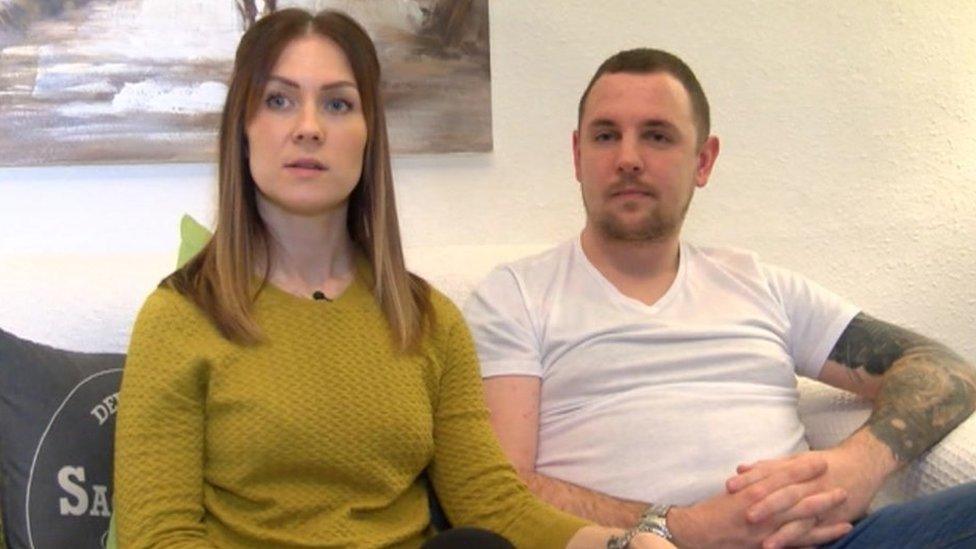Fully funding IVF would improve safety for mothers, experts say
- Published
- comments

Full government funding for IVF treatment would reduce the risk of harm to mothers and babies and save the NHS money, health experts have said.
It would help lower cases of women who have more than one embryo transferred into the uterus, which can cause risky multiple pregnancies, their study says.
Multiple pregnancies are the "greatest avoidable risk of IVF", it says.
The Department of Health said the NHS should be offering IVF for all patients who meet existing criteria.
'Greatest avoidable risk'
Multiple pregnancies are the most common adverse outcome of IVF treatment. They can happen when more than one embryo is transferred into the uterus.
This procedure is often carried out to reduce costs for patients who pay for their own treatment, the Royal College of Obstetricians and Gynaecologists' (RCOG) report said.
Multiple pregnancies are associated with a six-fold increase in the risk of pre-term birth - a leading cause of infant mortality and long-term mental and physical disabilities - as well as increased risks to mothers, such as pregnancy-induced high blood pressure and haemorrhage following birth.
But despite the risks of them occurring, double embryo transfer during IVF treatment continues.
The RCOG paper found that almost one in five IVF deliveries in the UK in 2011 involved a multiple birth.
Sweden has similar live birth rates but a high proportion of single embryo transfer, but during the same period the multiple birth rate was 4.9%.

In Vitro Fertilisation (IVF)
An egg is removed from the woman's ovaries and fertilised with sperm in a laboratory
The fertilised egg is then returned to the woman's womb to develop
IVF worked for the first time on 10 November 1977. On 25 July 1978, the world's first IVF baby, Louise Brown, was born
On average, IVF fails 70% of the time
The highest success rates are for women under 35
On average, it takes almost four-and-a-half years to conceive with IVF
Source: Human Fertilisation and Embryology Authority/Fertility Network UK

Current National Institute for Health and Care Excellence (NICE) guidelines recommend government funding for three full IVF cycles.
However, the recommendations are not binding and it is up to local NHS providers to decide what to offer.
The RCOG said there was a "postcode lottery" for funding across the country and six out of 10 IVF cycles in the UK were funded by patients themselves.
It said it was still widely believed by patients and health professionals that the success rate of IVF treatment was higher following the transfer of two embryos than with one embryo.
But the college said studies had shown that in women with a good prognosis, single embryo transfer is comparable to that of two embryos and with a significantly lower risk of multiple pregnancy.
It called for the a national commissioning policy to remove the current variation in IVF funding.
'Step up efforts'
Mr Tarek El-Toukhy, consultant gynaecologist and specialist in reproductive medicine and surgery, and lead author of RCOG's report, said: "The health and financial burden it places on women, families and the NHS cannot be overstated.
"To ensure rates of multiple births remain low, there is little doubt that the single most important factor that could enhance the acceptance of single embryo transfer among patients and practitioners is appropriate funding for IVF treatment."
Keith Reed, chief executive of the Twins and Multiple Births Association, said healthcare organisations needed to "step up their efforts to address the risks associated with multiple birth pregnancy".
"There is a growing body of evidence that good care and following multiple birth guidance during maternity reduces the poor outcomes and need for neonatal care which put pressure on NHS services."
A Department of Health and Social Care spokesman said: "As this report itself highlights, we have made great progress in improving patient safety by lowering the national multiple birth rate in IVF from 24% in 2009 to 11% today.
"We know fertility problems can have a serious and lasting impact on families—and the government has been clear that the NHS should provide access to IVF for all patients that meet the criteria set out in NICE guidance."
- Published30 October 2017
